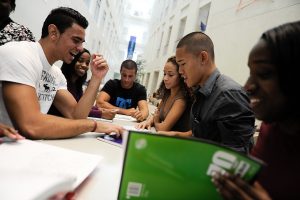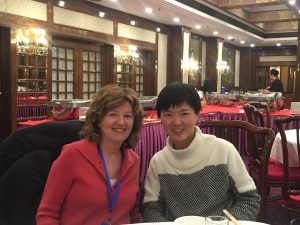 The Edward J. Collins, Jr. Center for Public Management is dedicated to improving efficiency, effectiveness, governance, and accountability at all levels of government, with a particular focus on state and local government. The talented staff of practitioners in this UMass Boston-based center have provided a comprehensive set of services to scores of the commonwealth’s cities, towns, school districts, and state agencies, as well as to a growing number of municipalities in other states.
The Edward J. Collins, Jr. Center for Public Management is dedicated to improving efficiency, effectiveness, governance, and accountability at all levels of government, with a particular focus on state and local government. The talented staff of practitioners in this UMass Boston-based center have provided a comprehensive set of services to scores of the commonwealth’s cities, towns, school districts, and state agencies, as well as to a growing number of municipalities in other states.
What’s new there? Here are a few updates and spotlights:
RESPECTFUL WORKPLACE TRAINING WORKSHOPS
With recent attention on workplace behavior, the Collins Center is pleased to offer customized “Respectful Workplace Training” for municipalities to bring critical diversity, sensitivity, and discrimination prevention knowledge to the city and town workplace. Experienced human resources professionals are also ready to help you review and update HR policies and classification plans, coach your staff, or plan any other trainings your staff needs.
For more details on this and other HR trainings, contact mary.aicardi@umb.edu.
CAPITAL IMPROVEMENT PLANNING
Capital planning is a key responsibility of municipal managers that confers multiple benefits to the community, including fiscal efficiency and stability, safety and security for personnel and the public, and effective achievement of community goals.
The Baker-Polito Administration’s Community Compact grant program has allowed many municipalities to create their first comprehensive, five-year capital improvement plan (CIP) with the support of Collins Center experts. To date, the center has completed more than 15 grant-funded CIPs through the program. Clients have ranged from smaller towns (with a population less than 5,000) to larger cities (with a population greater than 50,000) and are located all around the Commonwealth.
Center experts have developed an efficient process that helps municipalities 1) define and document capital needs, 2) identify financial resources, and 3) prioritize projects for funding. The center team then prepares a formal five-year CIP and can be available to present the plan in a public meeting. Finally, the municipality receives all the documents and supporting materials – along with clear “how-to” instructions – so that the CIP can be updated annually.
For more information, please contact sarah.concannon@umb.edu.
CHARTER REFORM
The last year was a busy one for towns and cities working on their foundational structures. The Collins Center worked with Framingham in its successful change from a town to a city and helped Fall River successfully enact a new charter to replace its existing one that dated back to 1934. In addition, the center helped Amherst draft a charter with a new form of government and several innovations that will go to the voters in this spring, and worked with the towns of Ashland and Harvard on updating structural details in their charters. Although defeated by voters in Newton, center experts drafted a new charter that would have reduced the size of the city council from 24 to 12, among other changes.
Charter change can be initiated by residents creating a Charter Commission through the ballot box or through the executive or legislative branch creating a Charter Study Committee or Government Study Committee.
The Collins Center has several charter experts on staff who are happy to consult with you as you contemplate charter change. For more information, please contact michael.ward@umb.edu.
EXECUTIVE RECRUITMENTS
The Collins Center has helped scores of cities, towns, and other entities hire town managers/administrators, executive directors, administrators, and department heads. Recently, the center completed successful recruitments for the town administrator in Southampton, the town manager in Mansfield, and the executive director of the Southfield Redevelopment Authority (the former South Weymouth Naval Air Station).
Currently, the center is assisting with searches for Winthrop’s town manager and the Franklin Regional Council of Governments director of finance. Click here for the list of the Center’s active recruitment projects.
For more information on retaining the Center for executive recruitment services or to apply for an open search, please contact richard.kobayashi@umb.edu.




